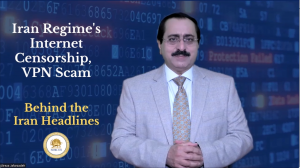Suppressing Dissent, Filling Coffers: Iran's Regime Capitalizes on Internet Censorship
How the Iranian regime's Supreme Leader, Ali Khamenei, and the IRGC work to silence protests and run a "VPN mafia" to profit from the scamming of their citizens
WASHINGTON, DC, UNITED STATES, August 22, 2023/EINPresswire.com/ -- Alireza Jafarzadeh, the deputy director of the Washington office of the National Council of Resistance of Iran (NCRI), made the following commentary about the prevailing Internet censorship by the Iranian regime:
Iran’s regime has found a way to turn massive internet censorship into suppression of the regime-change-seeking widespread protests and a profitable business.
It's not just a control mechanism but a thriving revenue stream, with state reports indicating that citizens pay steep prices for limited internet access. Internet users are often forced to buy data packages twice a week due to stringent restrictions, and the average cost of a VPN, essential for bypassing these restrictions, is relatively high.
Globally, Iran ranks third in internet disruption and limited access. Despite the government's intense filtering, approximately 70 million Iranians access social media daily. In response, around 48 million users turn to VPNs. The irony here is that the government also controls the VPN market, cashing in on the very tools that citizens use to evade their censorship.
In a world increasingly connected online, this exploitation of internet access offers a stark reminder of how oppressive regimes can even monetize the virtual world.
The regime’s key officials have referred to these VPN providers as a "mafia." Entities close to the IRGC, and other organizations, such as the Bonyad-e Mostazafan-- a foundation under the direct supervision of the Supreme Leader Ali Khamenei, who handpicks its president--are involved in this business, and the substantial profits they make aren't funneled back into the national treasury.
Iranian people, facing high prices, economic despair, and heavy oppression, all identify a common adversary: the ruling regime. The Iranian people’s quest for regime change continues to grow, and its trajectory is the eventual overthrow of the religious dictatorship.
-----------------------------------------------------------------------------------
BACKGROUND
The National Council of Resistance of Iran (NCRI) is a democratic coalition of Iranian opposition organizations and personalities and was founded in Tehran, Iran, in July 1981, as the alternative to the clerical regime, a month after the onset of the nationwide resistance to overthrow the ruling dictatorship.
The NCRI is committed to the affirmation of the people’s sovereignty in a republic founded on universal suffrage and pluralism; gender equality; separation of religion and state and freedom of religions and faiths; freedom of thought, press, and association; support for peace in the Middle East; plan for the autonomy of Iranian nationalities and ethnicities; and the Universal Declaration of Human Rights, as embodied in Mrs. Maryam Rajavi’s 10-Point Plan for Future Iran.
The NCRI would serve as a provisional government led by its President-elect Mrs. Rajavi, and its primary responsibility will be to hold free and fair elections for a national and constituent assembly within six months to ensure the peaceful transition of power to the elected representatives of the Iranian people.
The People’s Mojahedin Organization of Iran (PMOI), Iran’s largest, most organized opposition group, is the principal member of the NCRI.
------------------------------------------------------
These materials are being distributed by the National Council of Resistance of Iran-U.S. Representative Office. Additional information is on file with the Department of Justice, Washington, D.C.
NCRI-US
National Council of Resistance of Iran - US Rep. Office
+1 202-747-7847
email us here
Legal Disclaimer:
EIN Presswire provides this news content "as is" without warranty of any kind. We do not accept any responsibility or liability for the accuracy, content, images, videos, licenses, completeness, legality, or reliability of the information contained in this article. If you have any complaints or copyright issues related to this article, kindly contact the author above.

